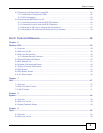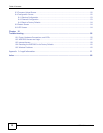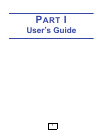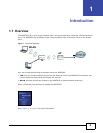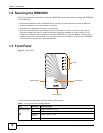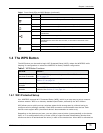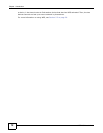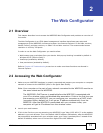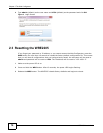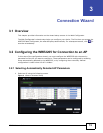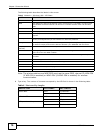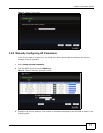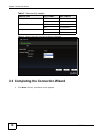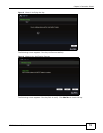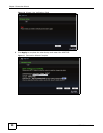
WRE2205 User’s Guide 13
CHAPTER 2
The Web Configurator
2.1 Overview
This chapter describes how to access the WRE2205 Web Configurator and provides an overview of
its screens.
The Web Configurator is an HTML-based management interface that allows easy setup and
management of the WRE2205 via Internet browser. Use Internet Explorer 6.0 and later versions,
Mozilla Firefox 3 and later versions, or Safari 2.0 and later versions. The recommended screen
resolution is 1024 by 768 pixels.
In order to use the Web Configurator you need to allow:
• Web browser pop-up windows from your device. Web pop-up blocking is enabled by default in
Windows XP SP (Service Pack) 2.
• JavaScript (enabled by default).
• Java permissions (enabled by default).
Refer to Chapter 10 Troubleshooting to see how to make sure these functions are allowed in
Internet Explorer.
2.2 Accessing the Web Configurator
1 Make sure your WRE2205 hardware is properly connected and prepare your computer or computer
network to connect to the WRE2205 (refer to the Quick Start Guide).
Note: Your computer or the part of your network connected to the WRE2205 must be on
the same subnet as the WRE2205.
The WRE2205’s DHCP server is enabled before the WRE2205 is associated with
your AP or wireless router and disabled after association. If this is the first time you
are accessing your WRE2205, you can configure your computer as a DHCP client
(computer factory default) so it will get an IP address automatically from the
WRE2205. After the WRE2205 is associated with your wireless router, your
computer will get its IP address from the wireless router.
2 Launch your web browser.
3 If this is the first time you are accessing your WRE2205, type "http://192.168.1.2" as the website
address in your web browser. This is the default LAN IP address. Alternatively, after the WRE2205
has successfully associated with your wireless router, type "http://zyxelsetupxxxx" instead of the
default IP address, where xxxx is the last four digits of the MAC address.



